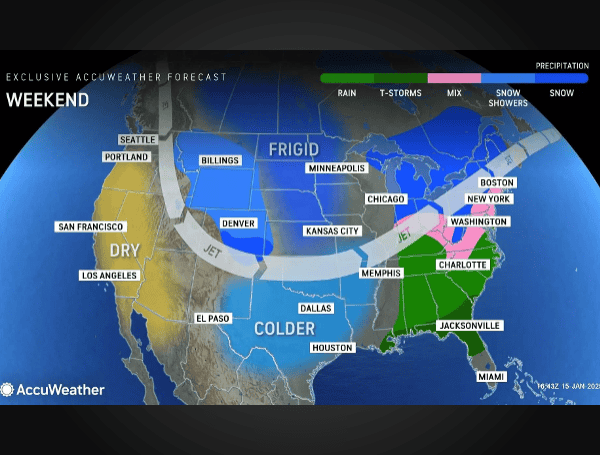AccuWeather meteorologists are warning of a prolonged period of frigid temperatures and multiple winter storms set to impact millions across the United States, from the Rockies to the East Coast.
Snow, Ice, and Bitterly Cold Temperatures
The first wave of this wintry onslaught will bring accumulating snow from the Midwest to the Great Lakes and central Appalachians from Wednesday night through Thursday night.
A clipper-style storm originating from Alberta, Canada, is expected to deliver 1-3 inches of snow to areas like Wisconsin, Michigan, Indiana, Ohio, West Virginia, Pennsylvania, and western New York. Some areas east of the Great Lakes and in the mountains could see up to 3-6 inches.
Meanwhile, a separate winter storm is forecast to bring accumulating snow to the higher terrain in Montana and Colorado starting Friday. AccuWeather predicts 3-6 inches of snowfall across parts of Colorado, Wyoming, Nebraska, and New Mexico, with a foot or more possible in the mountains west of Denver.
Starting Friday, a blast of arctic air will send temperatures plummeting across the eastern and central U.S. Many locations from the Dakotas to Colorado and northwestern Kansas will experience temperature drops of 30 to 40 degrees by the weekend. Overnight temperatures will dip below zero in many areas.
The frigid air is expected to persist through the middle of next week, bringing the coldest air of the winter so far to millions of Americans. AccuWeather RealFeel® Temperatures are forecast to be 10-20 degrees below historical averages for much of the eastern and central U.S.
READ: Los Angeles Wildfires: Death Toll Rises, Containment Progresses As Red Flag Warnings Persist
The combination of frigid temperatures and accumulating snowfall will create hazardous travel conditions, with ice and packed snow lingering for days. The freeze-up could also lead to significant ice jams on rivers and waterways in the coming weeks.
The arctic blast will cause a surge in heating demand, likely leading to increased energy costs. In the southern U.S., where heating is primarily electric, this could strain energy systems and potentially lead to power disruptions. Frozen pipes are also a concern, even in the Gulf Coast states, as overnight temperatures plunge below freezing.
AccuWeather meteorologists are also tracking additional winter storms that could impact travel and bring a wintry mix of precipitation to various regions, including the Midwest, Northeast, and Southeast. Slippery travel conditions are expected in many areas.
READ: Biden’s Last-Minute Cuba Order Sparks Outrage Among Florida Democrats, Boosts GOP Narrative
Forecasters are closely monitoring the potential for a significant winter storm to bring snow and ice to parts of the Gulf Coast states and Southeast early next week. This storm could bring wintry precipitation to areas that typically don’t experience it, potentially causing significant disruptions.
AccuWeather urges residents to stay informed about the evolving weather conditions and take precautions to protect themselves and their property from the cold. This includes dressing warmly, limiting time outdoors, and ensuring that homes and pipes are properly insulated.
Please make a small donation to the Tampa Free Press to help sustain independent journalism. Your contribution enables us to continue delivering high-quality, local, and national news coverage.
Connect with us: Follow the Tampa Free Press on Facebook and Twitter for breaking news and updates.
Sign up: Subscribe to our free newsletter for a curated selection of top stories delivered straight to your inbox.



